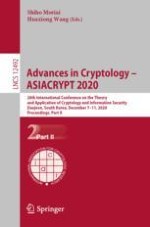2020 | OriginalPaper | Buchkapitel
Collusion Resistant Trace-and-Revoke for Arbitrary Identities from Standard Assumptions
verfasst von : Sam Kim, David J. Wu
Erschienen in: Advances in Cryptology – ASIACRYPT 2020
Aktivieren Sie unsere intelligente Suche, um passende Fachinhalte oder Patente zu finden.
Wählen Sie Textabschnitte aus um mit Künstlicher Intelligenz passenden Patente zu finden. powered by
Markieren Sie Textabschnitte, um KI-gestützt weitere passende Inhalte zu finden. powered by
